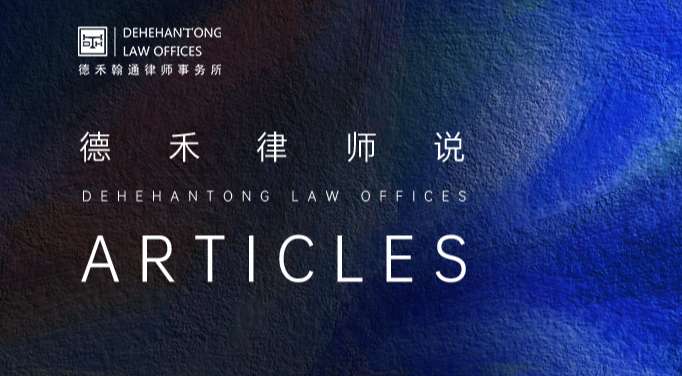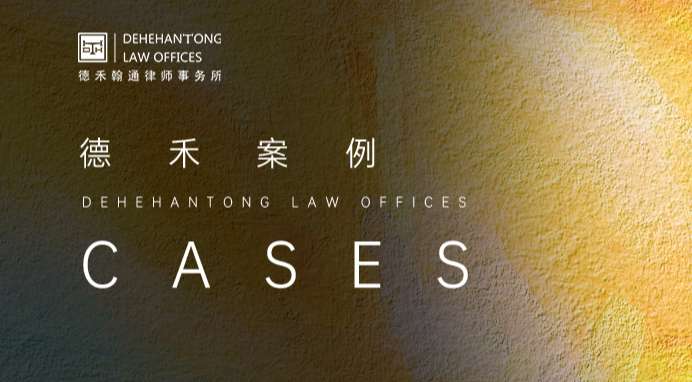Dehehantong Successfully Defended Client for Lesser Sentence: Client Convicted of Infringing upon Citizens' Personal Information Received Probation.
01. Introduction
In this case, the initial prosecution opinion of the investigation authority determined that A had sold over 70,000 pieces of citizens' personal information, with the involved amount being over 60,000 yuan. According to Article 253-1 of the Criminal Law of the People's Republic of China, A's actions may face a prison term of not less than three years but not more than seven years. However, through the efforts of the defense attorney, the procuratorate suggested reducing the sentence to one year and three months. The court ultimately sentenced the sentence to one year and three months in prison, suspended for two years, and a fine of 10,000 RMB. This judgment result reflects the effectiveness of the defense strategy and the precision of the application of the law.
This article analyzes a case of infringing upon citizens' personal information handled by Chen Shilei, a senior partner of Dehehantong Shanghai Law Office, and Ma Keting, a lawyer of Dehehantong Shanghai Law Office. It explores how to achieve a reasonable legal outcome for the criminal suspect through precise legal analysis and effective defense strategies in such cases, and at the same time provides reference and inspiration for the defense of similar cases.
02. Case Background
This case involves the criminal suspect A, who, from April 2023 to December 2024, posted advertisements on online platforms to attract customers to purchase citizens' information. He then used Telegram software to purchase citizens' personal information from customers, encrypted the information and forwarded it to them, making profits from it. After investigation, it was found that Person A sold a total of over 70,000 pieces of citizens' personal information, with the involved amount reaching over 60,000 yuan. On December 5, 2024, Person A was arrested by the public security authorities and later truthfully confessed to the above-mentioned criminal facts.
03. Legal Analysis of the Crime of Infringing upon Citizens' Personal Information
(1) Legal basis
According to Article 253-1 of the Criminal Law of the People's Republic of China, anyone who, in violation of relevant state regulations, sells or provides citizens' personal information to others and the circumstances are serious shall be sentenced to fixed-term imprisonment of not more than three years or criminal detention, and shall also or solely be fined. If the circumstances are especially serious, the offender shall be sentenced to fixed-term imprisonment of not less than three years but not more than seven years and shall also be fined. In this case, A's actions meet the constituent elements of this crime. He illegally obtained and sold citizens' personal information, and the circumstances were serious. He should be held criminally responsible for the crime of infringing upon citizens' personal information.
(2) Elements of the Crime
1. Subjective aspect: Party A has the intention of selling citizens' personal information for profit. It attracts customers by Posting advertisements on online platforms and proactively contacts the previous suppliers to purchase information, indicating that it is subjectively aware of the illegality of the behavior but still actively pursues illegal benefits.
2. Objective aspect: Party A has committed the act of illegally obtaining and selling citizens' personal information. It contacts its suppliers through Telegram software, obtains citizens' personal information, and then encrypts and forwards it to customers to make profits.
3. In terms of results: The actions of Person A have led to the illegal dissemination and use of a large amount of citizens' personal information, seriously infringing upon citizens' privacy rights and information security, and causing adverse social impacts.
04. Defense Strategy and Legal Basis
(1) Sorting out facts and evidence
The defense attorney conducted a comprehensive review of the facts and evidence of the case. By reviewing the confession, witness testimony, electronic data and other evidence of Person A, the defense found that although Person A had illegally obtained and sold citizens' personal information, there was no evidence to show that all the above information could be identified as an individual. Specifically:
1.Electronic data: It shows that Person A attracted customers by Posting advertisements on online platforms and obtained information by contacting the previous supplier through Telegram software. These data indicate that A's behavior has a certain degree of concealment, but there is no evidence showing that his behavior led to a large-scale leakage of citizens' information.
2.Witness statements: The statements of witnesses B, C, D and others confirmed the fact that A sold citizens' personal information to them, but only limited to mobile phone numbers and regions.
(2) Considerations of Sentencing circumstances
1. Circumstances of confession: After being arrested, Person A truthfully confessed his criminal facts, which meets the circumstances of confession stipulated in Article 67, Paragraph 3 of the Criminal Law of the People's Republic of China, and may be given a lighter punishment.
2. Confession and acceptance of punishment: During the trial, Party A voluntarily confessed and accepted punishment. According to Article 15 of the Criminal Procedure Law of the People's Republic of China, leniency may be granted.
3. Return of ill-gotten gains and Advance payment of fines: During the trial of this case, Party A returned the illegal gains of 49,000 yuan and advanced a fine of 10,000 yuan, demonstrating his positive attitude of admitting guilt and showing remorse.
(3) Consideration of the criminal purpose
The defense also emphasized the criminal purpose of Person A. Although Person A sold citizens' personal information for the purpose of making profits, there is no evidence to show that his actions caused particularly serious social harm. The defense attorney demonstrated through the following points that A's actions did not have particularly serious consequences:
1. Information type: The personal information of citizens illegally obtained and sold by Party A is mostly general information such as mobile phone numbers and the location of the mobile phone, and does not involve more sensitive personal information.
2. Information Usage: The information sold by Party A was mainly used for the needs of normal business operations and did not cause large-scale leakage of citizens' information.
3. Social harm: After the incident, Person A actively returned the ill-gotten gains and prepaid the fine, demonstrating his repentance.
(4) Doubts regarding the amount involved in the case and the determination of the data
The defense lawyer raised doubts about the amount and data involved in the case as determined in the prosecution opinion. The specific viewpoints are as follows:
There are doubts about the amount involved in the case:
1. The password red envelope between B and the suspect should not be regarded as illegal data trading for profit: According to B's interrogation record on page 15 of Volume 3, the data he purchased from A only included mobile phone numbers and location information, which was a raw mobile phone number and could not be used to identify a specific natural person alone. According to the "Interpretation of the Supreme People's Court and the Supreme People's Procuratorate on Several Issues Concerning the Application of Law in Handling Criminal Cases of Infringing upon Citizens' Personal Information", this data should not be recognized as citizens' personal information. Therefore, the amount paid by Party B should not be included in the illegal gains.
2. The password red envelopes given by Person C to the suspect should not be regarded as illegal data trading for profit: According to the interrogation record of Person C on page 20 of Volume 3, the data he purchased also belongs to the category of unprocessed mobile phone numbers and should not be recognized as citizens' personal information. The amount paid by person C should not be included in the illegal gains.
3. Party A has other normal loan business operations and it is impossible to distinguish which funds are illegal profits: Party A's daily business is loan business, and the funds generated from its normal business transactions with other customers should not be included in illegal gains.
4. Most of the data in A certain appraisal report of A has not been sold, and the profit amount cannot be calculated. According to the appraisal report of A certain mobile phone on page 67 of Volume Two, the number of personal information items in its mobile phone is 24,158, but most of them have not been sold. The personal data of the unsold part can only be considered as illegally obtaining citizens' personal information, and this part of the data should not be converted into the corresponding amount and included in the illegal gains.
There are doubts about the evidence for the determination of the involved data:
Among the data involved in A's case, there are sample data: According to the suspect's account, some of the data he stored were sample data sent to him by buyers, which had no selling or usage value and were only used as samples for buyers' reference. There were approximately 2,000 pieces in total.
2. The over 30,000 pieces of data sold to C and B do not fall under citizens' personal information: The suspect had no concept of bare accounts and mistakenly regarded the over 30,000 pieces of personal information sold to C and B as citizens' personal data. However, according to the self-statements of Person C and Person B, the data they purchased falls under the category of bare accounts rather than the scope regulated by citizens' personal information.
05. Court Judgments and Outcomes
After the efforts of the defense attorney, the court finally adopted the defense opinion. Defendant A was convicted of infringing upon citizens' personal information and sentenced to one year and three months in prison, suspended for two years, and fined 10,000 RMB. The court pointed out in the judgment:
1. Charge determination: Based on the facts and evidence of the case, A's actions meet the constituent elements of the crime of infringing upon citizens' personal information.
2. Basis for sentencing: Considering A's confession, his attitude of admitting guilt and accepting punishment, as well as his actions of returning the ill-gotten gains and prepaying the fine, the court lawfully imposed a lenient punishment and applied probation.
06. Case Summary and Implications
In this case, the term of imprisonment corresponding to the facts determined at the arrest stage has undergone a significant change from that corresponding to the facts determined in the final judgment. The prosecution opinion holds that Person A sold over 70,000 pieces of citizens' personal information, involving an amount of over 60,000 yuan, and may face a prison term of not less than three years but not more than seven years. However, through the efforts of the defense attorney, the court ultimately determined that A's actions met the constituent elements of the crime of infringing upon citizens' personal information. But considering various sentencing circumstances, he was sentenced to one year and three months in prison, suspended for two years, and fined 10,000 RMB. This judgment result is not only significantly lower than the prison term corresponding to the prosecution opinion, but also reflects the fairness and flexibility of the law, providing an important reference for the defense of similar cases.















